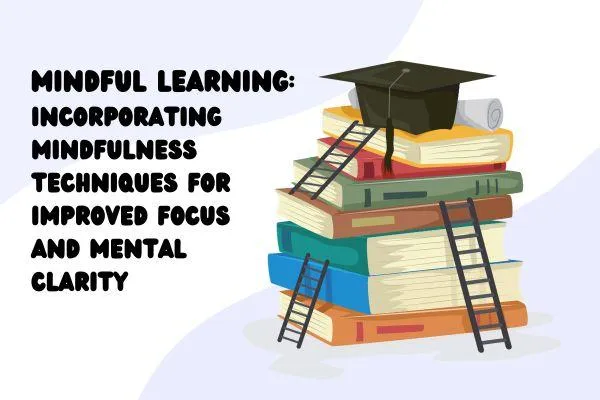
Mindful Learning: Incorporating Mindfulness Techniques for Improved Focus and Mental Clarity
In the fast-paced world of academia, where deadlines loom and information overload is a constant companion, the practice of mindfulness offers a sanctuary of calm and focus. Mindful learning is a powerful tool that can enhance concentration, reduce stress, and foster overall mental well-being. Let’s explore the benefits of mindfulness in the academic setting, introduce mindfulness techniques tailored for students, and offer practical tips for seamlessly incorporating mindfulness into daily routines.
Understanding the Benefits of Mindful Learning:
1. Enhanced Focus and Concentration:
Mindfulness promotes a heightened state of awareness, allowing students to engage fully in their studies. By training the mind to stay present, focus is sharpened, leading to more effective learning and improved concentration.
2. Stress Reduction:
Academic pressures can lead to stress and anxiety. Mindful learning provides tools to manage stress by encouraging a non-judgmental awareness of thoughts and feelings. This awareness helps students respond to challenges with clarity and composure.
3. Improved Memory and Retention:
Mindfulness practices, such as mindful breathing and meditation, have been shown to enhance memory and information retention. By calming the mind, students can better absorb and recall information.
4. Emotional Regulation:
Mindfulness equips students with the ability to navigate the emotional highs and lows of academic life. It fosters emotional regulation, allowing individuals to approach challenges with a balanced and composed mindset.
Mindfulness Techniques for Students:
1. Mindful Breathing:
Take a few minutes each day to focus on your breath. Inhale deeply, hold for a moment, and exhale slowly. This simple practice can be done anywhere and serves as an anchor to the present moment.
2. Body Scan Meditation:
Dedicate time to a body scan meditation. Close your eyes and systematically bring awareness to each part of your body, releasing tension and promoting a sense of relaxation.
3. Mindful Walking:
Transform routine walks into mindful experiences. Pay attention to the sensation of each step, the movement of your body, and the environment around you. This brings your attention to the present moment.
4. Guided Visualization:
Incorporate guided visualizations to create a mental sanctuary. Picture a calm and serene place, engaging all your senses. Use this visualization as a quick retreat during moments of stress.
Practical Tips for Incorporating Mindfulness into Daily Routines:
1. Start Small:
Begin with short mindfulness sessions. Even just a few minutes a day can make a significant impact. Gradually increase the duration as you become more comfortable with the practice.
2. Create Rituals:
Integrate mindfulness into existing daily rituals. Whether it's mindful sipping during your morning coffee or a brief breathing exercise before bedtime, associating mindfulness with established routines makes it more sustainable.
3. Use Mindfulness Apps:
Leverage mindfulness apps that offer guided meditations and breathing exercises. These apps provide structure and support for your mindfulness practice, making it accessible anytime, anywhere.
4. Designate Tech-Free Zones:
Establish areas where you consciously disconnect from technology. Use this time to engage in mindful activities such as reading, reflecting, or simply being present in the moment.
5. Join Mindfulness Groups:
Explore mindfulness groups on campus or online. Connecting with like-minded individuals creates a supportive community that encourages regular practice and provides shared insights.
Mindful learning is not just a trend; it's a transformative approach to education that nurtures the mind and soul. By incorporating mindfulness techniques into daily routines, students can experience improved focus, reduced stress, and enhanced overall well-being. The journey of academic learning becomes not only a pursuit of knowledge but also an exploration of self-awareness and resilience. Here's to a mindful academic journey filled with clarity, presence, and a deep sense of inner calm!
